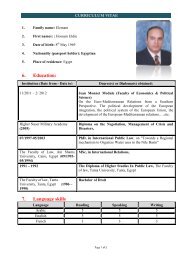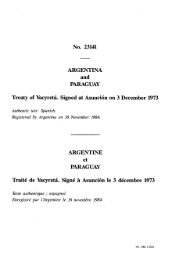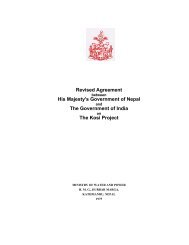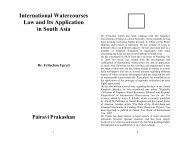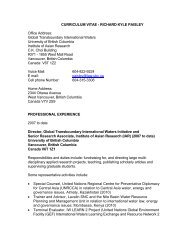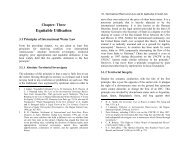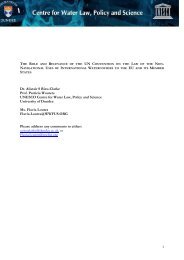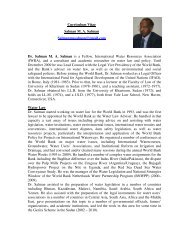Upreti, Trilochan, International Watercourses Law and Its Application ...
Upreti, Trilochan, International Watercourses Law and Its Application ...
Upreti, Trilochan, International Watercourses Law and Its Application ...
Create successful ePaper yourself
Turn your PDF publications into a flip-book with our unique Google optimized e-Paper software.
Equitable Utilisation / 129 130 / <strong>International</strong> <strong>Watercourses</strong> <strong>Law</strong> <strong>and</strong> <strong>Its</strong> <strong>Application</strong> in South AsiaHiggins 76 argues that Equity infra legem refers to the situationfaced by a court that has to choose between more than oneinterpretation of a legal rule; each interpretation beingacceptable from the legal point of view. In this circumstance,equity infra legem allows the court to determine whichinterpretation is the most just, considering the circumstances<strong>and</strong> balancing the rights <strong>and</strong> obligations of the contendingparties.With regard to equity praeter legem, Lowe has argued that it issimilar to the ratio decidendi in municipal law, but completelydiffers from international law. 77 However, its application is tofulfil the lacunae in the elaboration of rules, the content ofwhich are too general. But, it is debatable whether or not suchlacunae exist in certain circumstances. Cheng takes the view 78that such authorisation is indeed required, but there are otherswho disagree with him on the acceptance of equity praetorlegem. Even if the lacunae exist, the judge has the authority tofill them by his or her interpretation. Higgins held the view thatequity contra legem is “a softenening of the applicable normfor extra-legal reasons.” 79 It is apparent from the analysis thatthe role of equity as a means of correcting the application of alegal rule is still a moot point.The use of equity contra legem is to soften the application foran extra-legal reason. Higgins argues that the very purpose ofusing equity is that it is fulfilling the basic objectives as a tool.For some, equity allows the decision rather than embrace a justsolution. That is to say, equity does not only provide a solution;but rather, it gives broader discretion for having a fair <strong>and</strong>acceptable solution to the dispute. It is based on the idea that a76 R. Higgins, Problem <strong>and</strong> Process: <strong>International</strong> <strong>Law</strong> <strong>and</strong> How We UseIt, Oxford: Clarendon Press, 1994, p. 219.77 Supra note 74, pp. 58-59.78 Supra note 76, p. 220.79 Supra note 66 p. 220.court has the right to decide a case contrary to the relevant legalrules when it considers such rules to be 'unjust' in the deliveryof a fair verdict in tune with equity contra legem. Unlike theother two forms of equity, equity contra legem can go beyondthe ambit of legal rules in order to obtain the required <strong>and</strong>expected result. In this sense, equity contra legem could bevery similar to the ex aequo et bono principle, which does notwork under the legal rules but rather contrary to the confines ofthe rules of law. In essence, it works beyond the legal regime.Conversely, within this rule, the court is free to apply suchprinciples, as it deems suitable in the interest of fair justice.There are many examples in international arbitral tribunalswhere infra legem has been applied <strong>and</strong> decisions made. Forexample, the Iran-US claim tribunal decided a series of disputesbetween the parties by its application. 80 In ascertaining theamount of compensation against nationalisation, there is noproper rule as such, that explicitly stipulates a certain amount ascompensation. In such circumstances, equity provides thearbitrator with a principle to ensure the fair amount beawarded. 81The general notion of equity is designed to be an aid todecision-makers in order to ensure greater justice <strong>and</strong> fairness.It is not possible by the application of the rigid provision of lawbut by the application of other factors such as socio-economic,cultural or political ones. Moreover, the achievement of a fairresolution of a dispute always requires the application ofequity. In this light, its invocation is essential. It should,however, not be understood that equity falls beyond the legalambit or allows decision makers to decide as they please. It has80 16 Iran-US Claims 1987, 112, p. 221: in Starrett Housing Corp v. Irancase, the Tribunal supports the principle that when the circumstancesmilitate against calculation of a precise figure, the Tribunal is obligedto exercise its discretion to ‘determine equitably’ the amount involved.Also see II Iran-US Claims 1986, Harza v. Iran, T. R. 76, p. 11.81 Supra note 74 p. 57-58.




